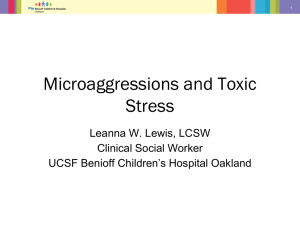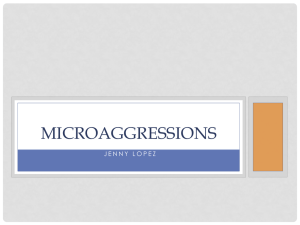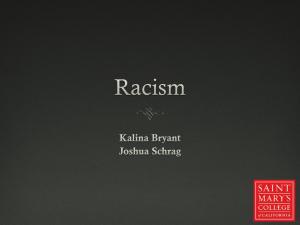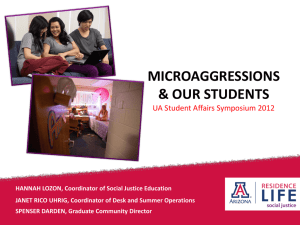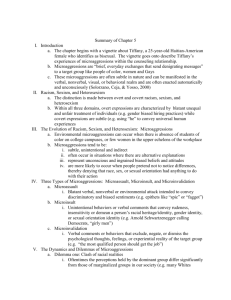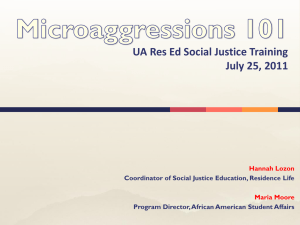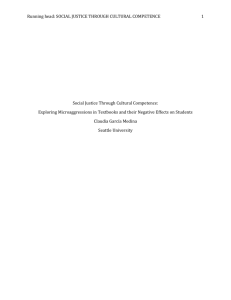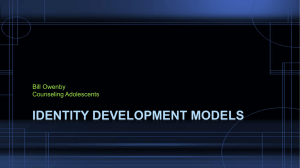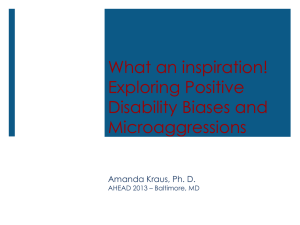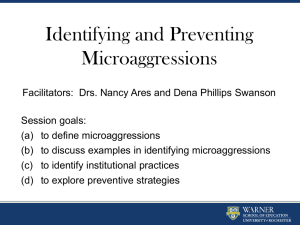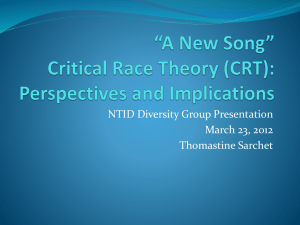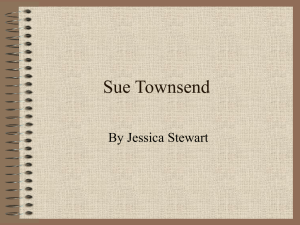Psychology of Language - Collab
advertisement
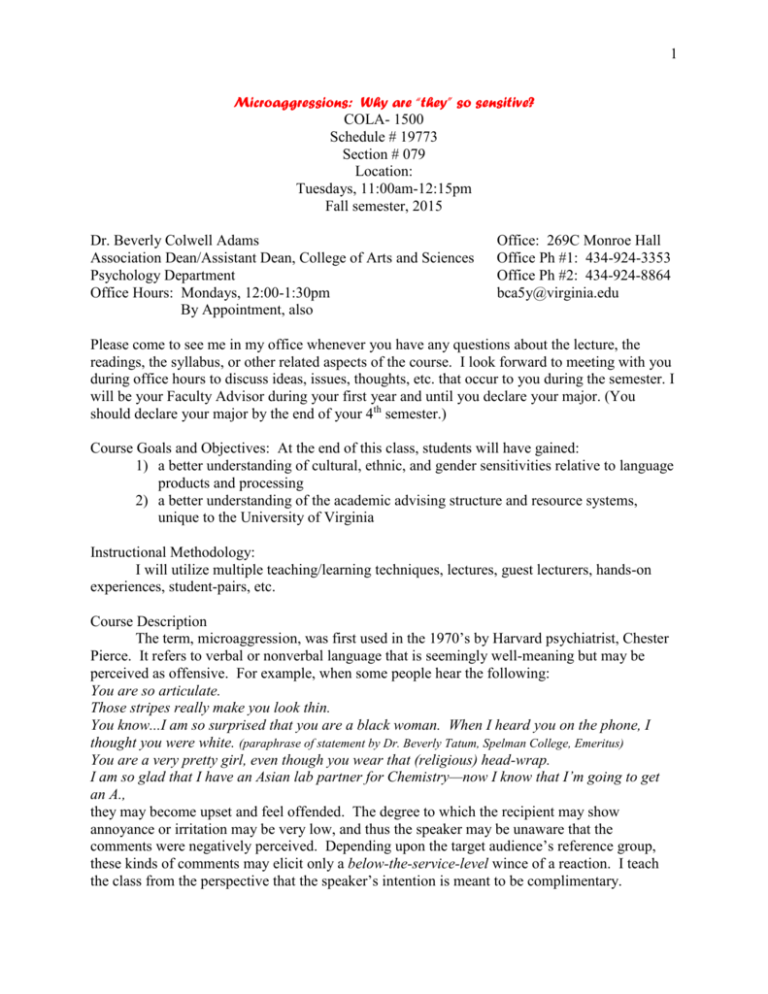
1 Microaggressions: Why are “they” so sensitive? COLA- 1500 Schedule # 19773 Section # 079 Location: Tuesdays, 11:00am-12:15pm Fall semester, 2015 Dr. Beverly Colwell Adams Association Dean/Assistant Dean, College of Arts and Sciences Psychology Department Office Hours: Mondays, 12:00-1:30pm By Appointment, also Office: 269C Monroe Hall Office Ph #1: 434-924-3353 Office Ph #2: 434-924-8864 bca5y@virginia.edu Please come to see me in my office whenever you have any questions about the lecture, the readings, the syllabus, or other related aspects of the course. I look forward to meeting with you during office hours to discuss ideas, issues, thoughts, etc. that occur to you during the semester. I will be your Faculty Advisor during your first year and until you declare your major. (You should declare your major by the end of your 4th semester.) Course Goals and Objectives: At the end of this class, students will have gained: 1) a better understanding of cultural, ethnic, and gender sensitivities relative to language products and processing 2) a better understanding of the academic advising structure and resource systems, unique to the University of Virginia Instructional Methodology: I will utilize multiple teaching/learning techniques, lectures, guest lecturers, hands-on experiences, student-pairs, etc. Course Description The term, microaggression, was first used in the 1970’s by Harvard psychiatrist, Chester Pierce. It refers to verbal or nonverbal language that is seemingly well-meaning but may be perceived as offensive. For example, when some people hear the following: You are so articulate. Those stripes really make you look thin. You know...I am so surprised that you are a black woman. When I heard you on the phone, I thought you were white. (paraphrase of statement by Dr. Beverly Tatum, Spelman College, Emeritus) You are a very pretty girl, even though you wear that (religious) head-wrap. I am so glad that I have an Asian lab partner for Chemistry—now I know that I’m going to get an A., they may become upset and feel offended. The degree to which the recipient may show annoyance or irritation may be very low, and thus the speaker may be unaware that the comments were negatively perceived. Depending upon the target audience’s reference group, these kinds of comments may elicit only a below-the-service-level wince of a reaction. I teach the class from the perspective that the speaker’s intention is meant to be complimentary. 2 However, to the recipient(s), these kinds of statements are generally perceived as microaggressive; i.e., microassaulting, microinsulting, or microinvalidative (Sue, 2010). A microaggression is a linguistic expression that may create unconscious friction between/among individuals or groups, and this tension is never addressed. According to Sue (2007, 2010), liberal whites (and sometimes nonwhites) use microaggressions as a way to show their concern and commitment for racial, cultural, and sexual egalitarianism, and are genuinely surprised when told that these kinds of comments may create a wider divide. My plan for this class is to hold class periods for 1.25 hours (75 minutes) each week during the Fall (2015) semester. TEXTBOOK: The main class readings will include Derald Wing Sue’s book, Microaggressions in Everyday Life: Race, Gender, and Sexual Orientation (2010). Research articles, utube clips, a play, etc. will supplement the textbook. Attendance Attendance at all classes is expected. If you must miss a class, you should contact me by email as soon as you know that there is a problem and find out (from me) what you should do. Grading Class Participation Partner Questions & Reaction Papers Individual Questions & Reaction Papers Final Class Project All assignments are due in COLLAB -- 25% -- 25% -- 25% -- 25% on Sundays on or before 4:45pm. Final Project/Paper (1) Students will take a survey that asks them to rate their reactions to a list of possible microaggressions. (2) Each student will collect a corpus of microaggressions (5 examples) that he/she hears in his/her everyday interactions around Grounds (and the greater community). In your final paper, you will discuss these (real world) statements with regard to selfidentity, self-esteem, and (psycho) linguistic ambiguity. Use psychological and sociological (and whatever seems relevant) literature to enforce your points. Paper length = 3-5 pages Cell Phones/Electronics All cell phones and electronic devices must be turned off during class and in the closed position. Laptops/ipads/anything with an on/off switch can be brought to class, but will remain off unless specific instructions are given for their use. You can take notes using your ipad or computer. However, please do not use your laptop or ipad for purposes other than taking class notes, unless otherwise instructed. The Honor Code All written paper assignments are pledged work, under The UVA Honor Code. I encourage you to discuss class material and textbook material with your classmates and other 3 students. However, your written work should be YOUR work ALONE. I encourage you to use Spell-check and Grammatik and go the LRC or Writing Lab before you turn in your paper assignments. Spelling errors and grammatical errors are very serious errors in college work! They will not be tolerated. Please ask me about any concerns or questions that may arise that are related to possible Honor Code violations. Note: The Partner Projects “must” be collaborative work! Collab and email should be checked on a regular basis (at least once per day) for possible updates about assignments. 4 Syllabus at a Glance August 25, 2015 Microaggressions in Everyday Life: Race, Gender, & Sexual Orientation Sue (2010) Week 1 Introduction and discussion about microaggressions and language ambiguity General outline for the class will be presented. Complete Microaggression Questionnaire before you begin reading Chapters 1 and 2. September 1 Week 2 Manifestation of Racial, Gender, and Sexual-Orientation Microaggressions Sue (2010) Chapter 1: The Manifestation of Racial, Gender, and Sexual-Orientation Microaggressions Chapter 2: Taxonomy of Microaggressions Questions will be found in COLLAB. Submit answers by Sunday, Aug. 30, 2015, before 4:45pm. What is an Association Dean? (Plan to meet with your Association Dean – week of Oct. 12.) What is a Faculty Advisor? September 8 Week 3 Chapter 3: Psych Dilemmas and Dynamics of Microaggressions (partners) Sue (2010) It’s not easy being green…Kermit The Frog Is “green” a metaphor? (Substitute the word(s) a Native American, black, gay, Latino, a woman, an Asian American, a Muslin, overweight, etc. etc.) Reactions? View 1st It’s not easy being green (Kermit the Frog and Lena Horne) https://www.youtube.com/watch?v=mPvZR6DTbq8 View 2nd It’s not easy being green http://www.youtube.com/watch?v=hpiIWMWWVco Last Day to ADD a class - Tuesday, September 8, 2015 Last Day to DROP a class - Wednesday, September 9, 2015 September 15 Week 4 Chapter 4: Microaggression Process Model (individual) Library Orientation – We will meet in Clemmons Library Sue (2010) September 22 Week 5 Chapter 5: Microaggressive Stress (partners) Sue (2010) Writing Center – guest speaker http://www.engl.virginia.edu/undergraduate/writing/center September 29 Week 6 Chapter 6: Microaggressive Perpetrators and Oppression (individual) We will play the “MAJORS” game! What is a major? What are the possible majors at UVA? Sue (2010) Siy, J.O., Cheryan, & S. (2013). When Compliments fail to flatter: American individualism and responses to positive stereotypes. Journal of Personality and Social Psychology, 104, 87-102. (individual) (We will assign parts for The Play.) Reading Days are October 3-6, 2015 October 6 Week 7 Fall Break October 13 Week 8 Chapter 7: Racial/Ethnic Microaggressions and Racism (partners) The PLAY (We will perform in class.) Sue (2010) 5 Mercer, S.H., Zeigler-Hill, V., & Wallace, M. (2011). Development and initial validation of the inventory of microaggressions against black individuals. Journal of Counseling Psychology, 58, 457-469. Plan to meet with your Association Dean during this week! October 20 Week 9 Chapter 8: Gender Microaggressions and Sexism Please view the utubes with your partner. Sue (2010) Sh*t Girls Say http://www.youtube.com/watch?v=u-yLGIH7W9Y&feature=context-cha #1, #2, #3 Sh*t White Girls Say...to Black Girls (http://www.youtube.com/watch?v=ylPUzxpIBe0)? http://www.youtube.com/watch?v=lDN0BI1mgjw&src_vid=ylPUzxpIBe0&annotation_id=annotation_426331 Donovan, R.A.., Galban, D.J., Grace, R.K., Bennett, J. K., & Felicie’, S.Z. (2012). Impact of racial macro- and microaggressions in black women’s lives: A preliminary analysis. Journal of Black Psychology, 39, 185-196. Last Day to withdraw from a class: Tuesday, October 20, 2015 October 27 Week 10 Chapter 9: Sexual Orientation: Microaggressions and Heterosexist (individual) Sue (2010) South Park: Trapped in the Closet (21 minutes) (partners) http://www.southparkstudios.com/full-episodes/s09e12-trapped-in-the-closet Friday, October 23 – Sunday, October 25, 2015 Family Weekend November 3 Week 11 Chapter 11: Microaggressive Impact on Education and Teaching (individual) Sue (2012) Boysen, G.A. (2012). Teacher and student perceptions of microaggressions in college classrooms. College Teaching, 60, 122-129. November 10 Week 12 Career Services - We will meet at Bryant Hall (in the UCS library) November 17 Week 13 Chapter 12: Microaggressive Impact on Mental Health Practice (partners) Sue (2010) Counseling and Psychological Services (CAPS) – Student Health (Mr. Leonard Carter) Student Disabilities Access Center (SDAC) – Student Health November 24 Week 14 No Class Thanksgiving Holiday December 1 Week 15 Class Wrap-Up Minikel-Lacocque, J. (2013). Racism, College, and the power of words: Racial micoaggressions reconsidered. American Educational Research Journal, 50, 432-46. Chapter 10: Microaggressions in the Workplace/Employment (partners) Sue (2012) Final Project/Paper is due! Complete Microaggression Questionnaire by December 6, 2015. December 6 Final Paper (corpus of microaggressions) will be accepted without penalty: 11:55pm; 12/06/2013 Complete Microaggression Questionnaire by December 6, 2015. J-term (January term, 2016) – courses begin January 4 - 15, 2016 Spring semester begins Monday, January 20, 2016 References 6 September 8 – Week 3 View 1st It’s not easy being green (Kermit the Frog and Lena Horne) https://www.youtube.com/watch?v=mPvZR6DTbq8 View 2nd It’s not easy being green http://www.youtube.com/watch?v=hpiIWMWWVco September 29 – Week 6 October 13 – Week 8 The Play October 20 – Week 8 Sh*t White Girls Say...to Black Girls (http://www.youtube.com/watch?v=ylPUzxpIBe0)? http://www.youtube.com/watch?v=lDN0BI1mgjw&src_vid=ylPUzxpIBe0&annotation_id=annotation_426331 Sh*t Girls Say http://www.youtube.com/watch?v=u-yLGIH7W9Y&feature=context-cha South Park: Trapped in the Closet (21 minutes) http://www.southparkstudios.com/full-episodes/s09e12-trapped-in-the-closet Boysen, G.A. (2012). Teacher and student perceptions of microaggressions in college classrooms. College Teaching, 60, 122-129. Donovan, R.A.., Galban, D.J., Grace, R.K., Bennett, J. K., & Felicie’, S.Z. (2012). Impact of racial macroand microaggressions in black women’s lives: A preliminary analysis. Journal of Black Psychology, 39, 185-196. Mercer, S.H., Zeigler-Hill, V., & Wallace, M. (2011). Development and initial validation of the inventory of microaggressions against black individuals. Journal of Counseling Psychology, 58, 457-469. Minikel-Lacocque, J. (2013). Racism, College, and the power of words: Racial micoaggressions reconsidered. American Educational Research Journal, 50, 432-46. Siy, J.O., Cheryan, & S. (2013). When Compliments fail to flatter: American individualism and responses to positive stereotypes. Journal of Personality and Social Psychology, 104, 87-102. Textbook: Microaggressions in Everyday Life: Race, Gender, and Sexual Orientation Written by bestselling author Derald Wing Sue, Microaggressions in Everyday Life: Race, Gender, and Sexual Orientation is a first-of-its-kind guide on the subject of microaggressions. This book insightfully looks at the various kinds of microaggressions and their psychological effects on both perpetrators and their targets.
